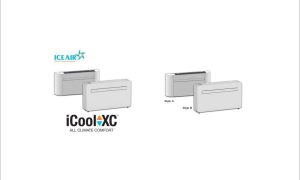The global heat pump market is set for significant growth, projected to reach US$58.7 billion by 2033. This article delves into key drivers, challenges, and regional insights shaping its trajectory.
The global heat pump market is witnessing robust growth, driven by various factors such as energy efficiency, environmental concerns, government regulations, advanced technology, versatility, and renewable energy integration. The market is expected to secure a valuation of US$ 34.3 billion in 2023, with a projected growth to reach US$ 58.7 billion by 2033 at a CAGR of 5%. This article provides an in-depth analysis of the market, key driving factors, challenges, historical performance, and future growth prospects.
Key Factors Driving the Global Heat Pump Market:
Energy Efficiency: The increasing demand for eco-friendly heating and cooling systems with high energy efficiency is a significant driver for heat pump adoption, reducing costs and energy consumption.
Environmental Concerns: Growing awareness of reducing greenhouse gases has led to a surge in demand for heat pumps across various industries, promoting renewable energy sources.
Government Regulations: Governments worldwide are incentivizing the installation of energy-efficient heat pumps, promoting efficiency and reducing carbon emissions.
Advanced Technology: Ongoing research and development efforts are leading to the creation of more efficient and cost-effective heat pump systems that meet consumer requirements.
Versatility: The wide range of applications, from cooling to heating, is increasing the demand for heat pumps, making them a suitable option for various purposes.
Renewable Energy Integration: The rising demand for solar and wind energy is accelerating the adoption of heat pumps, enabling the storage and conversion of excess energy.
Urbanization and Population Growth: The global rise in population and urbanization is boosting the demand for efficient heating and cooling solutions.
Long Lifespan: Consumers’ preference for durable and reliable heat pumps with a long lifespan is driving market revenue.
Air Quality and Comfort: The need for efficient temperature control and improved indoor air quality is propelling the adoption of heat pumps.
Challenges in the Global Heat Pump Market:
High Costs: The initial costs of heat pumps compared to traditional systems pose a challenge, particularly for small businesses and cost-sensitive consumers.
Installation Complexity: Challenges in sizing and installing heat pumps due to a lack of skills and expertise may limit market growth.
Geographic and Climate Limitations: Issues related to mild and very cold climates may affect the suitability of heat pumps in certain regions.
Lack of Awareness: Limited consumer awareness about the capabilities and benefits of heat pumps may hinder market growth.
Retrofitting Challenges: Installing heat pumps in existing buildings can be challenging and expensive, potentially slowing market growth.
Energy Source Unavailability: The lack of clean and renewable energy sources in certain regions may decline the demand for heat pumps.
Maintenance and Repairs: Regular maintenance is essential, and the unavailability of repair services may pose challenges for consumers.
Noise Level: The production of high noise levels during operation, especially in residential areas, may impact sales.
Limited Availability: Growing competition, alternative choices, and limited availability may decrease heat pump adoption.
Historical Performance and Future Growth:
The global heat pump market witnessed steady growth, reaching a valuation of US$ 33.1 billion in 2022. Increasing environmental concerns and a focus on energy efficiency have driven consumer demand. Government initiatives and technological advancements, along with commercial and residential applications, contribute significantly to market growth.
Comparative Analysis of Adjacent Heat Pump Markets:
According to Future Market Insights (FMI), the heat pump market is expected to dominate adjacent markets, including the heavy-duty heat pump market and the fire pump market. Key differentiating aspects, growth factors, opportunities, and key trends for each market segment are outlined.
Country-wise Insights:
- United States: The market is projected to capture a CAGR of 3.90%, driven by rising demand in residential and commercial sectors, supported by government emphasis on eco-friendly practices.
- Germany: With a CAGR of 3.30%, Germany’s market is expanding due to increasing demand for energy-efficient solutions and a focus on developing low-carbon, eco-friendly heat pumps.
- United Kingdom: A CAGR of 6.20% is anticipated, fueled by government initiatives promoting clean energy solutions and innovations in reducing environmental impacts.
- China: Expected to secure a CAGR of 6.10%, China’s market growth is attributed to robust infrastructure, a wide range of products, and government policies targeting reduced greenhouse gases.
- India: Anticipated to register a CAGR of 5.70%, India’s market is growing due to rising industrialization, commercial usage, and the adoption of solar heat pumps.
Category-wise Insights:
- Top Product: Air-air heat pumps are estimated to dominate the market with a 43.8% share in 2023 due to their versatility and cost-effectiveness.
- Top End-use Sector: The residential sector is projected to capture a 61.7% share in 2023, driven by increasing demand for highly efficient heating and cooling solutions.
Competitive Landscape:
The global heat pump market is highly competitive, with key players such as Viessmann Group, Danfoss Group Global, United Technologies Corporation, Stiebel Eltron Group, Glen Dimplex Group, The Bosch Group, Mitsubishi Electric Corporation, Panasonic Corporation, NIBE Group, and Daikin Industries Limited. Recent developments, including acquisitions, product launches, and investments, showcase the industry’s dynamism.
Recent Developments:
- In 2022, Viessmann Group acquired a stake in Pacifica Home Services Ltd. to expand its HVAC solutions portfolio.
- Glen Dimplex Group launched an air-to-water heat pump in 2020, designed for indoor and outdoor use with space-saving installation.
- Daikin Europe N.V. invested US$ 302 million in a new plant in Poland to manufacture heat pumps for residential purposes by 2024.
- Johnson Controls acquired FogHorn in 2022 to enhance manufacturing processes through the Internet of Things.
The global heat pump market is on a trajectory of substantial growth, driven by key factors such as energy efficiency, environmental concerns, and government initiatives. Challenges such as high costs and installation complexity need to be addressed to unlock the full potential of the market. With a competitive landscape and constant innovations, the heat pump market is poised for further expansion, offering sustainable and efficient heating and cooling solutions globally.
Source – https://www.futuremarketinsights.com/reports/heat-pumps-market
Cookie Consent
We use cookies to personalize your experience. By continuing to visit this website you agree to our Terms & Conditions, Privacy Policy and Cookie Policy.















